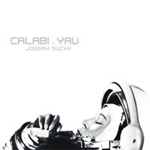|
|
 |
Dusted Reviews
Artist: Joseph Suchy Album: Calabi.Yau Label: Staubgold Review date: Feb. 15, 2004 |

|
|
|
 |
From what I gather Calabi.yau is an expression / computation of 10-dimensional space associated with string theory. Before Joseph Suchy’s Calabi.yau has made a single rotation around the laser-guided helios of your CD player, you should be thinking about pre-history, dark matter and grand unified theory and how they can be expressed in sonic terms. Ok, so this is heavy shit then. What ensues is not subtle refraction of layered tones you might expect (a la Eno) but rather something closer to radio wave transmissions from beyond, like, the pre-beyond.
Suchy, known mainly as a guitarist, shares almost nothing with other experimental guitar types. He never shows off his chops like the free jazz boys, but also eschews the melodic sense of some of the academics (Keith Fullerton Whitman) and minimalists (Roux, Davis, et al.). I tend to prefer the pastoral expanses of the latter and indulge in the schizoid of the former from time to time, but neither camp seems to have much influenced Suchy. The first time a guitar is even audible on this record is after about 15 minutes. The sombre “Su-Um” plods along a funeral guitar line treated with galactic ambience. Space is indeed a downtrodden place. Its predecessor, the title track, accumulates random beeps and blips across a modal background hum – the sparseness suggesting the sterile, white-paneled walls of an orbiting rocket ship.
Six-string crops up in increasingly altered states throughout Calabi. “Soan-Ne” introduces layers of stuttering, echo harmonics before stretching them into elongated sound swaths. “Kaalay” begins with a sweet finger-picked phrase that, again, descends into a negative energy sinkhole. The long, bleak passages of (presumably) digitally manipulated guitar become a bit trying as the song structures repeat themselves. Calabi’s tone rarely departs from this zero gravity aimlessness which, despite conveying a consistent feeling, fails to deeply engage. The closer “Kaon-On,” a ruminative folky ramble, finally shifts from the blueprint, but does so a little too late. The narrative guitar line combined with snippets of digital effects achieves a balance regrettably missing from the rest of the album.
Although the songs Calabi.yau often fizzle into a haze, they evidence Suchy’s commitment to expanding the sound possibilities of guitar. Not content with full-on signal processing or straightforward riffs, the composition and appreciation of his music requires some serious work. Sounding little like his contemporaries, hopefully his future efforts will achieve a greater aural unity.
By Marc Gilman
|







